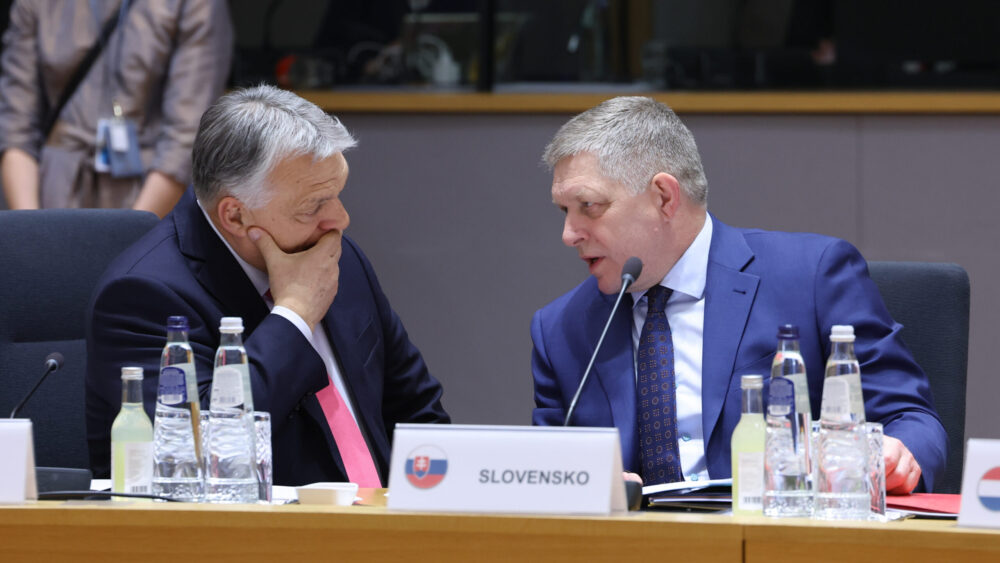The anti-sovereigntist hysteria in Brussels has reached an almost unbelievable level lately. One pro-EU news site went as far as to call for “war” against the Slovak and Hungarian governments, just because they refuse to sign off on the 18th sanction package against Russia until they get guarantees that the EU won’t undermine their energy security.
The furious note was written by foreign affairs editor Andrew Rettman and appeared in the Monday edition of the daily newsletter of EUobserver, a liberal, pro-establishment news site headquartered in Belgium.
Rettman began by calling Slovak PM Robert Fico and Hungarian PM Viktor Orbán “Kremlin shills” for blocking the newest sanctions proposals last week—even though they approved the extension of all previous 17 packages—and then called on the EU not to give any concessions to them, but “take away everything instead.”
The editor didn’t hold back, clearly calling for Brussels to crank up its politically-motivated lawfare as a means of extortion, without even pretending it’s about the rule of law or democracy:
Hit them with anything you can: frozen funds, infringement proceedings, court cases, intrusive audits, public insults, boycotts.
Rettman had some friendly “advice” to the other member states too: start spying on Budapest and Bratislava in the hope of digging up something compromising that could be further used to blackmail the sovereigntist governments.
“Get your intelligence services to work and put some hard truths in the hands of Hungarian/Slovak/European journalists,” he wrote.
If these two little traitors want a war with the EU—let’s give them one.
While these words are certainly among the most radical examples of public discourse in Brussels, they do not represent an isolated view. In fact, they’ve been enabled by the EU’s endless smear campaigns against anyone who dares go against the mainstream narrative—and that primarily means conservative, sovereigntist governments.
For one, calling democratically elected leaders “traitors” because they prioritize their own national interests over Brussels’ is neither nice nor make any sense—if anything, it should apply to those who sacrifice their nations for brownie points from Ursula—but everyone’s entitled to their opinion.
However, the fact that Rettman calls for full-on institutional abuse, violating every democratic principle that the EU was built upon, is a much more serious—and dangerous—matter.
The EU has already been steadily eroding member state sovereignty while weaponizing the law and its self-serving interpretation of ‘EU values’ against conservatives every chance it gets. For some, this is not enough, apparently, and they want to economically bleed out two member states until their citizens learn the lesson and replace their governments with ones who understand the party line.
What’s more, the entire argument that Hungary and Slovakia veto the sanctions because they are Russian puppets is incredibly narrow-minded at best, or flat-out evil at worst.
Both countries have already stated they have no problems with the contents of the 18th package. What they do have a problem with is a separate proposal under the REPowerEU instrument that would make it mandatory for all EU member states to completely phase out Russian energy imports by the end of 2027, whatever it takes.
As we explained before, the proposal makes no difference to the majority of Western European countries, which have either already replaced Russian oil and gas or have the necessary infrastructure in place to do so at a moment’s notice.
For Central Europe, however, the situation is completely different. Simply because of their geography, the landlocked countries of Slovakia and Hungary would be enormously disadvantaged if the legislation was adopted, cutting them off from Russian pipeline gas and forcing them to turn to much more expensive alternatives,—which would cause household energy prices to quadruple overnight.
Instead of decreasing energy dependency, like Brussels says phasing out Russian gas would, the new measures would the Central European member states entirely reliant on a single source of Western LNG, shipped via their neighbors. Hungary would be entirely dependent on Croatia’s LNG terminals (which has increased its transit fees fivefold since the beginning of the war), and Slovakia would have no choice but to buy Norwegian gas via Germany, also losing the vital transit fees it currently earns for supplying Czechia and Austria.
Besides, the current EU treaties (Art. 194 TFEU) explicitly state that Brussels has no business telling any member state who it can or can’t buy energy from, which means the proposal is violating fundamental EU laws. But it’s okay, apparently, if it’s against Russia.
It would be less of a problem if the measure was presented as a sanction (which it technically is), which falls under foreign policy and needs unanimous approval. But the Commission is trying to circumvent national vetoes by making it a “trade and energy” legislation, requiring only qualified majority support.
This gives Slovakia and Hungary no other choice than to use their veto somewhere else—such as the 18th sanctions package—in an attempt to save their economy and energy security.
Not that all these technicalities would matter much in Brussels. The Commission—or the EUobserver—couldn’t care less if two countries representing just 3% of the EU keep Russian gas flowing, as long as the other 97% cut off their supply. What they care about are governments that refuse to toe the line—and they’re willing to do whatever it takes to bring them down. If that means making 15 million people suffer until they vote for the ‘right’ parties, then so be it. Just “hit them with anything you can.”
